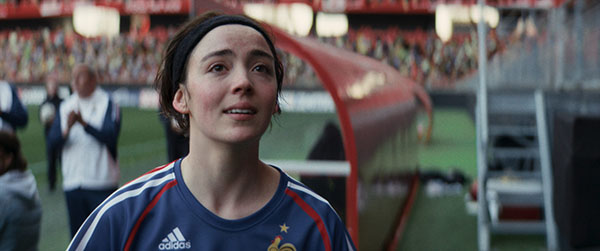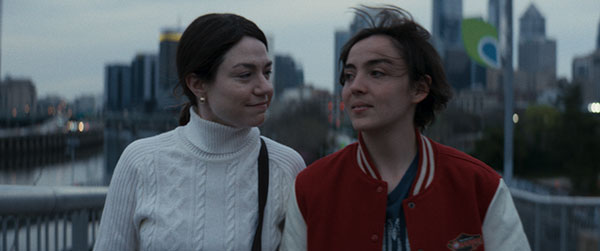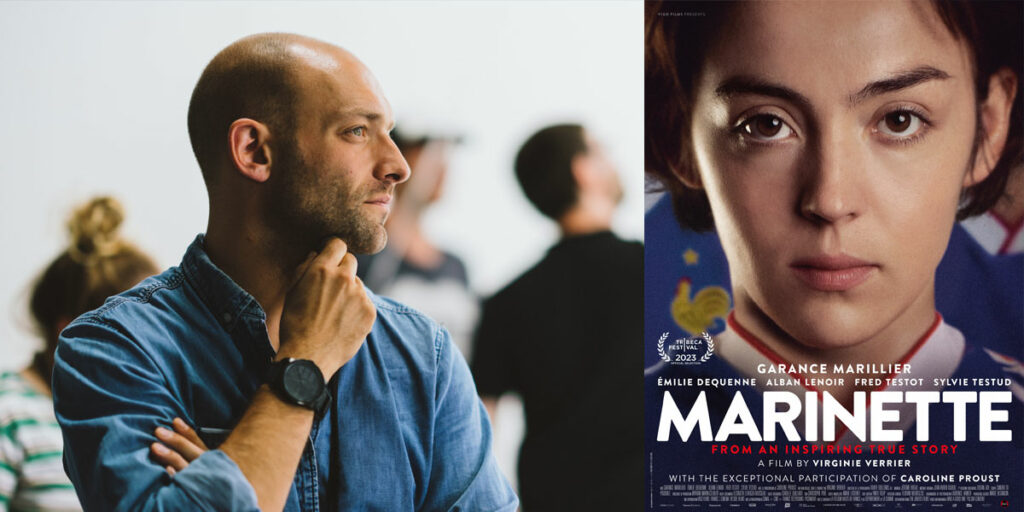Marinette ’s cinematographer Xavier Dolléans sat down with us for an interview, following the movie’s premiere at the Tribeca Film Festival.
Former French soccer player Marinette Pichon (Garance Marillier, Raw) is depicted as a determined young woman in Virginie Verrier’s Marinette, which has just had its World Premiere at the Tribeca Film Festival. The film sees her get the attention of the French national team, before a major American club notices her talent, prompting Marinette to move to the U.S. to pursue her dream of becoming the best player in the world.
The movie is very fast paced and has to balance a lot of information, like many other biopics, sometimes through its cinematography. As the story progresses and Marinette’s soccer matches become more and more complicated, so does the visual style of the film. So, to help us break down the decisions behind the visual language of this sports biopic, director of photography Xavier Dolléans joins us for an interview to discuss his work on Marinette.
Xavier Dolléans On His Past Work & How It Led Him To Marinette
Would you mind giving us a brief introduction to your career? What have you worked on in the past?
Xavier Dolléans: I work mainly on narrative. I’ve worked on TV shows both in France and the U.S., and I’ve done feature films too, though I’ve primarily been doing limited series these past few years. An example is Germinal, a six-part limited series for which I was selected at the CAMERIMAGE film festival in 2021. Prior to that, I filmed six seasons of a 10-episode show called Skam France: that was a nice experience, very fast shooting. The last film I did was Marinette. Overall, I’ve worked on many series in France, as well as short films, music videos, commercials, fashion shows, and documentaries.
How did you get involved with Marinette? What spoke to you about the project that made you want to be a part of it?
X.D: I’ve known the director, Virginie Verrier, since the first feature film she did five years ago, À 2 heures de Paris, which I worked on. I did one week of additional sequences at that time, since the main DP was not available, and we were happy working together. Eventually, she was reached by a friend of hers who told her, ‘I’ve just read a biography about a girl soccer player, and I think you might like it, because I know you like those kinds of stories.’

It was a short book about Pichon’s life: Verrier read it, and decided to meet her and conduct interviews with the mother, the sister, people involved in the soccer team, and the coaches. Afterwards, she began writing during the pandemic, and once that was done, she searched for financing, but made the decision to produce the movie herself. In 2021, I finished shooting on Germinal at the beginning of the year, and around September 2021 she told me, ‘I’m ready to go. Do you want to go with me?’, and I said yes.
Pre-production started in September and ended in January 2022. Many tests were made about how to shoot on a soccer field, how to create big and small spaces, the intimate moments and the big action of soccer. There was a lot of talking and testing equipment, but also storyboarding and all that stuff during production.
Xavier Dolléans On The Look Of Marinette
Marinette is portrayed as someone who believes she’s only good at this one thing, soccer. Filmmakers often feel that way about their craft as well. Is that how you feel about your work? Is there a little bit of yourself reflected in the film’s visual style?
Xavier Dolléans: In a way, this is what Virginie and I liked, because the title of Pichon’s book is “Never Let Go” – or, in French, “Ne Jamais Rien Lâcher.” This refers to this idea of pushing for everything you want – for your dreams, and this is probably something Virginie and I have in common, as a director and DOP, respectively. Together, we knew that it was going to be fulfilling to give the movie energy in terms of framing, editing, having action, then we would see fragile moments in Marinette’s life, and then action again. We push and you learn, but then a new thing happens. We really wanted to add that energy of the ups and downs you can have in life.
While researching the film, I found that you and the team used a tool called the Agito. Can you tell us more about this technique and how it helped you achieve the look of the movie?
X.D: Actually, we looked for many tools to shoot on the soccer field, and we searched for every technique: spider-cams, camera on cable, very long lenses, and FPV drones. When we tested them, we learned a few things: Virginie wanted to be close to the actors. So, what can you do to be very fast and stay close, but not use any long lenses?
We had to use the Agito – a small, lightweight electrical rover – because when you want to be fast and you want to be lightweight, it is not so easy to find a good tool. Regular tools are quite heavy for soccer fields, so after one take you are basically going to destroy the field. We were looking for something lightweight and steady that you can use to shoot close. We also used wide lenses because at one point we learned that the Agito was super close, so we had to put 100mm lenses on to make some close ups, because Virginie wanted it to be in the manga style – like, the kind of soccer that you’d find in the manga world. We had a one day test with a guy using the Agito in France. You have a driver and an operator on the remote so that they can frame the shot, and you try to coordinate everybody and everything, from the players to the action and the ball itself. But the Agito was sometimes disturbed by the field. When you go fast, you can lose the straight line, so you have to coordinate.
Understanding how to use it has been a big learning process. That was new for the guy with the Agito as well, because they were mainly working on fashion shows and concerts, and they were not doing it very fast. The tool allows you to go up to 60 kilometers per hour. For the most part, we shot at 30 kilometers per hour, but still, that’s fast and we needed to learn how to use the tool. We probably did 20 days of shooting with the Agito on the soccer field, and Virginie was happy with the result. Sometimes, she’d tell me, ‘this is too clean. We should do the same action, but this time you are running with the Sony Venice camera.’ I did many takes like that. It was a mix of those techniques, and every time I tried a shot with a long lens, or I was far away, she’d tell me, ‘I don’t want that. I want to stay close and I want to be in the soccer match, and other times I want to stay with the actors, not showing the whole action.’ She knew about that very early in the process.
How Visuals Further The Story & Themes of Marinette
One of my favorite visuals in Marinette is when she is eyeing this other girl, Sophie the tenniswoman, and the way it is shot feels claustrophobic due to the crowd, but also intimate. How do you give small character moments as much attention to detail as the bigger scale stuff without losing your footing?
Xavier Dolléans: We tried to do this as much as possible, because Marinette had many different stories in her life. Some of them were really important for us to show. Like the beginning, when she tried dating men, you know? Then she discovered that she was into women, and she discovered that by watching other women, being touched by other women on the soccer field, and being in contact with them. It had to be something very romantic. We wanted something beautiful to shoot at the end of the day, so we took our time, while also trying to connect with the soccer field. Marinette and Sophie are going about on the side of the field, and then they move to the locker rooms, and they make love in the locker rooms. It’s a beautiful sequence.

Virginie wanted to use music here. It was always going to be a romantic and intimate scene, but we totally improvised the first kiss on the soccer field. I was with Virginie at the end of a regular day of filming: I quickly saw the sky and told her, ‘we should go outside, look: this is beautiful! Let’s just take one camera.’ My camera assistant followed me – technically speaking, the day had already ended, but we saw that moment and we were very responsive to it. That is why I always have my Blackmagic 12k camera on the side ready, with a set of lenses. I can be very responsive at the end of a day and improvise shots. You don’t want to look around, realize that the camera is in the truck, and then think, ‘I should have shot this beautiful sunset, but it’s too late.’
When we spend moments in Marinette’s childhood house with her abusive father, it is always portrayed in a bleak manner from a photography standpoint. Scenes are always in shadow with a little bit of light coming through the window.
X.D: The crew wanted something dark in the house, with a little bit of light coming through, close to the walls, and characters who are next to each other, because this is a small house. We really wanted to film in a real house, as it would feel authentic in terms of set decoration, but the house was so small that it was very hard to have the whole crew inside. Even the equipment had to be carried a certain way. Then, I knew I wanted to use the sun but keep some scenes more gray, so we tried to film that rhythm in the other sequences we had. A few of them are a bit dark; in others, you can feel it is summer, but everyone inside has a strange feeling of bad things that can occur. We tried to make that idea of having the sun, feeling the seasons, but also feeling that kind of oppression when you are inside the house.
Later on, we see these visuals return when Marinette is in an abusive relationship of her own. Were these parallels intentional?
X.D: Yeah, we searched for a darker interior too. In the end, Marinette’s father and her abusive partner are connected by their behavior, so we added the same kind of feeling, even if the place where the scenes in the U.S. take place is much bigger. By the way we didn’t actually shoot this in the U.S.: the house we filmed in was in France, since we wanted something with dark and brown tones to kind of have the same feeling of the small house.
But yeah, definitely: those two characters [Marinette’s father and her partner] are connected in their behavior, and it was interesting to have a parallel between those two. We improvised a little bit, especially in the lover’s house in the U.S. For example, during an argument between Marinette and her lover, there is a shot that is similar to another scene where the father is seated on the couch and Marinette comes home from a soccer game. In the present day, they’re actually coming from the bar and they’re going back to the house. The lover is watching Marinette and she’s sitting on the couch in the same position as the father in front of the TV. After this, you obviously know what is about to happen.
There’s an obvious homage to Rocky going up the steps towards the third act. I’d assume that must’ve been a fun sequence to shoot. Is that something that you guys planned ahead? Was it part of the script, or was it something the crew came up with on the day?
X.D: Virginie wanted to do a homage, because Marinette moved to the U.S. for the soccer team in Philadelphia. I believe the training was done about 30 to 40 kilometers from the center of Philadelphia, but for the first months her mother was with her. Virginie wanted to give a feeling of the first night at the hotel, and show us what Marinette would do in Philadelphia after her arrival. She was very precise that she wanted to film on the Rocky steps.
It’s funny, because we watched all the old Rocky movies, even the most recent one, Creed, and in all of them, you can find beautiful shots of the city. If you stack all the beautiful shots in those movies, you quickly realize they’re all very similar, so there’s only so much you can do to change it up and add your own flair. Virginie wanted the film to have a similar rhythm, so we scouted those locations for the steps, and other locations in Philadelphia. I was trying to mimic the same reframing at the end of the Rocky moment. This is something that we planned ahead.
Xavier Dolléans On The Future Of Cinematography & His Next Projects
I wanted to get your perspective on AI, since you’re a cinematographer. You might be aware of online trends with people taking older films and messing with the aspect ratio using artificial intelligence. Do you see yourself using such a tool in the future in your work or not?
Xavier Dolléans: That’s a very good question. My very short answer to that is yes, I’m going to use AI. The reason is that this is coming, and you can’t stop it. When you have new tools coming, you can’t stop them and you have to be able to be in control of them, so you have to know them very well. I think in the years to come the topic will probably be, ‘as a human, what am I bringing that’s different from AI? Are we still connected to the emotion in the script? When using that AI tool, am I connecting to the script, to the story, to the emotion? Is the viewer involved with what I’m creating visually?’
I think we don’t have a choice. Those tools are coming. This is like when digital appeared, actually. We were like, ‘do you see yourself shooting digital in the years to come?’ People were probably saying ‘no, not really: I like 35mm.’ Now, this is not a question anymore. This question is more about how we can stay human. How can we stay strong enough as humans to use those tools and still be in control to create new, exciting things? I recently shot Damon Lindelof’s Mrs. Davis for Peacock – a story of a nun fighting an artificial intelligence. The answer in that series, for example, is fascinating. The relationship that you can have with an algorithm, and how you believe the algorithm to be very smart, but maybe it isn’t.
Right now, everybody’s doing pitch decks and mood boards: we are all using AI, although not for everything. We’re still taking some references the old school way, with frames from movies, but we are also using some images generated by AI. We type a few words on AI programs and see if it can come up with something interesting. A friend and I were talking to my colorist, Karim El Katari, about the texture of an image and how difficult it is to bring that texture when you compress the image too much. When you get a streamer like Netflix, the texture of an image can be destroyed because it can’t handle the amount of data from the original source. So, my friends and I were discussing a possible way to add an extra layer of texture in order to protect the original quality of an image. But this can only be done by AI. AI can open the mind to new ways of thinking and new ways of creating images. So, I believe we have to stay in control and in order to stay in control you have to know your tools.
It’s like, you have to almost get ahead of the game and stay in control of these tools, rather than the tools taking control of the people operating them.
X.D: Yeah.
What are you working on next? Any projects that we should keep an eye on?
X.D: I’m in pre-production for a six-part limited series for the French TV network about a strange phenomena happening in the sea North of France. They discover a big giant monster under the sea, but this series is kind of a “fantasy meets ecology” story. You can also watch Mrs. Davis streaming on Peacock: I shot part of that series.
This interview has been edited for length and clarity.
Marinette premiered at the Tribeca Film Festival on June 11, 2023.

